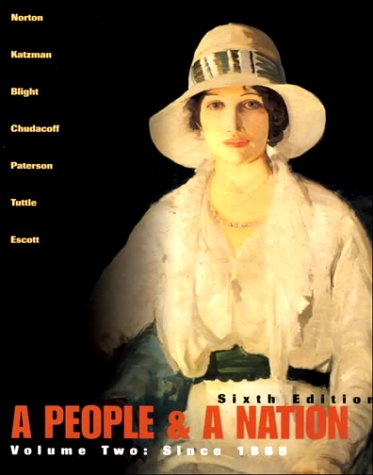
Sign up today for this modern history course and come to appreciate the complex history of the US, from the end of the Civil War to the New Millennium.
Special Notes: Optional Honors Track is available with this course. Includes a writing component. Due to the popularity of this course, it is offered twice this semester. Choose the time that works best for your family.
How to get the most out of Modern American History (1865 - 2000) with Phillip Campbell:
- First, read the course materials below before the first class meeting.
- Then have a notebook ready and available for class notes each live session.
- Read assignments before class.
- Watch that week’s recording if you need to revisit information from our live session.
- Do the assignments, quizzes, and any extra work assigned for that week.
- Once the course is completed to the parent's and professor’s satisfaction, there is a Certificate of Completion at the end to be filled in for your records.
Total classes: 12
Duration: 55 minutes
Prerequisite: None. However, a background in early American History will be helpful, but not required. Mr. Campbell's short course on the Great Depression is also helpful (available through Single Access or Unlimited Access).
Suggested Grade Level: 9th to 12th grade
Suggested Credit: One full semester History, Modern History, or American History (add Honor’s designation if your student chooses the Honor’s Track)
Instructor: Phillip Campbell
Instructor Email: phicampiii@gmail.com
Course Description: Beginning in the ashes of the Civil War, this course takes students through the industrial revolution and into modern America, helping them understand complex events as the rise of American industrialism, the Great Depression, the Cold War, Vietnam War, cultural revolution of the 1960's, America's involvement in the Middle East and much more, highlighting issues of particular interest to Catholics. Optional Honor's Track: For details and instructions, please watch this video:
Course Outline:
-
Week 1: The Reconstruction Era
-
Week 2: Age of the Robber Barons
-
Week 3: Closing of the West
-
Week 4: American Imperialism
-
Week 5: The Wilson Years
-
Week 6: The Roaring Twenties
-
Week 7: The Age of FDR
-
Week 8: The American Dream
-
Week 9: The Cultural Revolution
-
Week 10: The Stagnant 70's
-
Week 11: Morning in America
-
Week 12: Toward the New Millennium
Course Materials.
This course requires two items (three for the Optional Honor’s Track):
The Textbook: A People and A Nation Vol. II, 6th edition, by Norton, Katzman, et al (ISBN-13: 978-0618005529 or ISBN-10: 0618005528). Please make sure you get the inexpensive 6th edition with the 1920’s woman on the cover at https://www.amazon.com/People-Nation-History-United-States/dp/0618005528/ -- don't buy the grossly expensive newer editions. NOTE: This is a secular textbook. The instructor chose it because it goes into a level of depth beyond many other textbooks, and it explains that there is more than just one narrative of how America's history has unfolded, something which Catholics (as a historically persecuted minority in this country) ought to understand. The instructor will have students skip readings if he feels they are unfriendly to Catholic sensibilities.
The Sourcebook: In addition to the textbook, students will complete primary source readings out of a Sourcebook (70 pages). The Sourcebook can be purchased at this link for $15. You will be directed to a PayPal page; click "Pay with debit or credit card” and continue. The file will be emailed to you within three business days in the form of a PDF file.
If you are taking the Optional Honor's Track, you will also need this booklet, The Significance of the Frontier in American History by Frederick Jackson Turner found at https://www.amazon.com/Significance-Frontier-American-Frederick-2014-02-13/dp/B01FGOQDN2
Homework: Homework consists of approximately 20-30 pages of textbook reading per week, plus brief readings from primary sources that are found in the Sourcebook. Students are expected to complete 2 to 3 short essays weekly. Essays are graded by the instructor.
- Teacher: Phillip Campbell